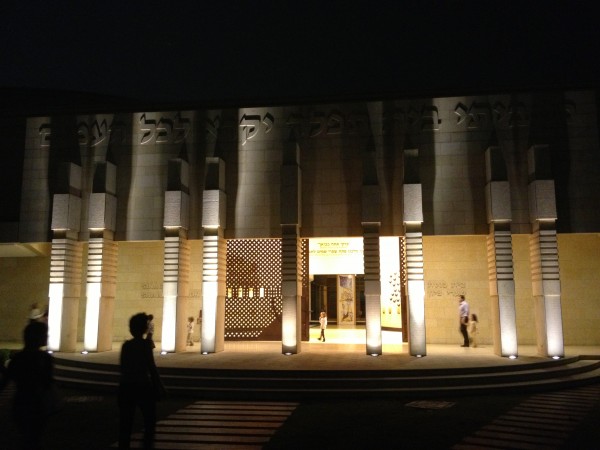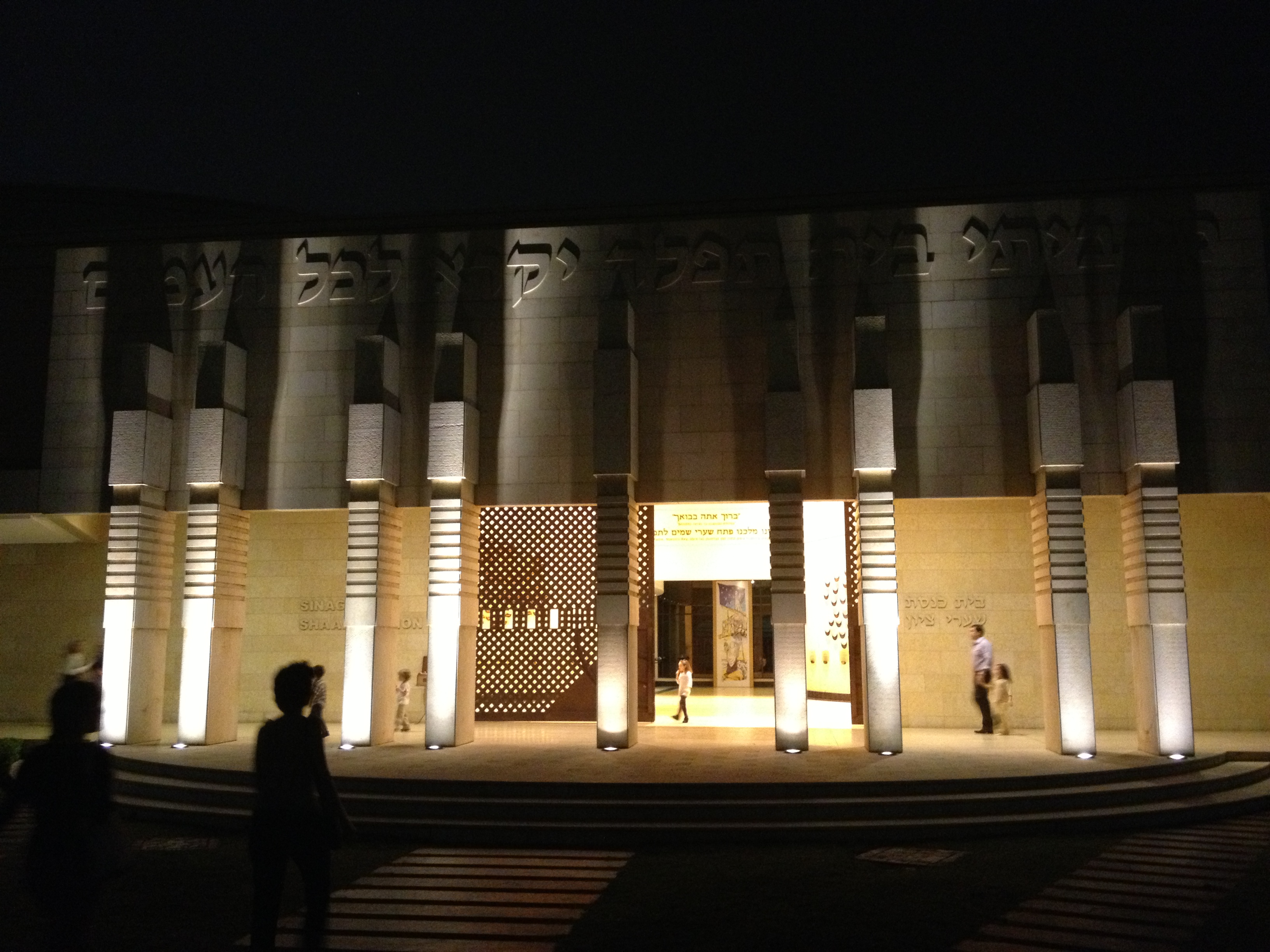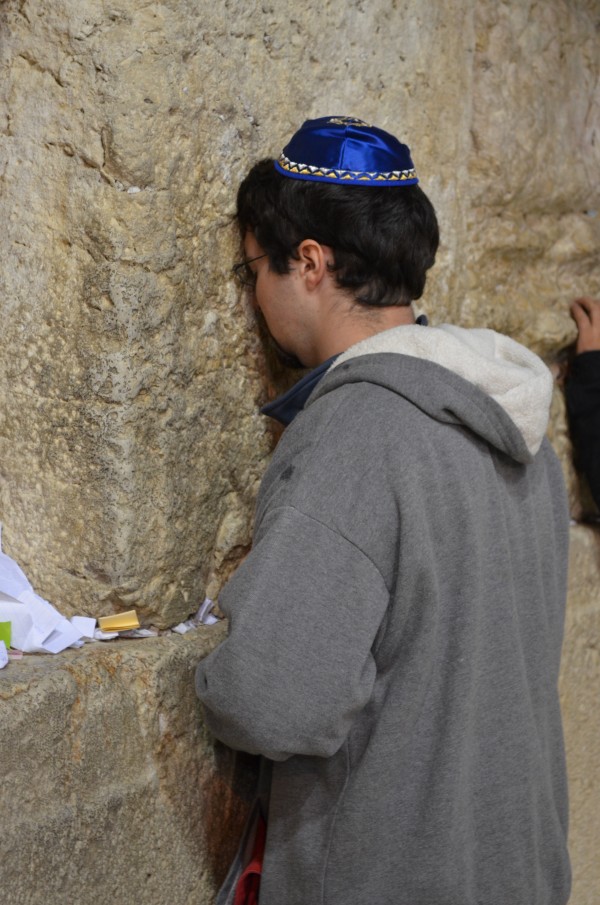
San José is an ugly city. The streets are lined with storefronts due for a paint job. Trash and dog droppings line the sidewalks. Every afternoon, like clockwork, the tropical weather brings in a rainstorm that puts most Sunday showers stateside to shame. At night, drug dealers and (legal) prostitutes roam the streets.
In this foul city filled with Catholics and atheists, a small stone building unassumingly occupies a corner on one of the major thoroughfares out of the city.
The first time I visited Congregation B’nei Israel, my taxi driver and I almost missed it. Addresses aren’t done by numbers in Costa Rica. Its official address: “800 meters west of La Sabana’s Pops on the Old Escazú Highway.”
I only recognized it by a magen david built into the tall windows facing the side road, blending in magnificently into stone that resembled the walls of every building in Jerusalem.
Security was tight. A guard checked my identification to make sure it matched the name I gave days earlier. Congregants from around the country filled the relatively small synagogue. Some had traveled from the neighborhoods and cities immediately surrounding San José. Some traveled over an hour by car from the country’s western coast. Some were native Costa Ricans, some were American expats, volunteers and English teachers.
All of them were Jews.
It was the first religious service in Costa Rica that truly spoke to me. Even though I was in Central America, I was able to pray freely as we toggled between Hebrew, Spanish and English.
It was Yom Kippur of 2013.
A month earlier, I attended Shabbat services in the only Conservative synagogue in the nation’s capital. It’s probably the only place besides the local Chabad that services the Jews of Costa Rica’s Central Valley.
Security was even tighter then. I found a member family, friends of a friend of a friend, who brought me to services. We drove up to a large cement wall. Armed guards checked the driver’s ID as more men patrolled the wall itself. He waved us in as a massive door slid open to reveal the inner courtyard, where we made our way to the parking garage. Once inside, we walked past more walls to an inner courtyard, which housed the shul itself in a massive building modeled on the channukiyah.
From the street, passersby wouldn’t think this was a synagogue. Perhaps a military base or the headquarters of a gringo corporation, but never a house of worship.
“Why all the security?” I asked my sponsor. He reminded me of the 1994 bombing of a synagogue in Argentina.
For the small but dedicated community of Latin America, it shook them to their core, so much so that it had the same impact that 9/11 had on security at my home synagogue in Franklin Lakes, N.J.
***
I returned in November to the United States after four months in Costa Rica. A mere three weeks later, I was boarding my plane to Israel.
31 other Americans and I were on Kesher, the Union of Reform Judaism’s offshoot of Birthright. After four and a half months living in a country with barely 3,000 Jews, in a place where people had not heard of Israel or had even met a Jew before, it was a comforting feeling to be in the majority.
I didn’t have to worry about anti-Semitism.
I didn’t worry if the magen david I wore around my neck was showing.
I was allowed to explore my own religion rather than constantly explain it to others.
Granted, I never really felt threatened in Costa Rica. But I wasn’t open about who I was. I didn’t talk about being Jewish unless it came up in conversation.
But that lack of companionship can hurt.
The swastikas in every bathroom stall in Costa Rica were meant to be homophobic or racist more than anti-Semitic. But their near daily presence was excruciating.
The first villain we met in my literature class was a moneyed murderer named Aaron Loewenthal.
When I talked about my upcoming trip to Israel, eyes glazed over out of ignorance or sheer disinterest.
It was hard not to take some of these personally. It was hard being Jewish. There were no Shabbat dinners or daily prayers in my life, so I felt Jewish a grand total of three times in Costa Rica. I had to seek out spiritual enlightenment, and that usually only happened within the walls of the synagogue.
That stood in stark contrast to Israel, where being Jewish was pervasive and, by extension, easy. Everything around our hotel on the Kinerret closed on Shabbat, forcing time for reflection and relaxation. Kosher food is bountiful. Hebrew is omnipresent.
But I felt just as Jewish at services at B’nei Israel as I did when I was surrounded by it in Israel. 10 hours in a shul in Latin America was as spiritually fulfilling as 10 days in the Holy Land.
I do not need to live in Israel to live a Jewish life. I carry my religion with me everywhere I go, and I embrace it wherever I have the opportunity, even if that’s in a nondescript building on the outskirts of a Central American city.
The Jews have been a diasporic people for thousands of years. We’ve adapted even as European Jewry was all but wiped out by Hitler and the Nazis. We adapted after the destruction of the Temple in the form of the Talmud. Judaism, by its own design and by its status as a global minority, has always been a difficult religion.
That’s what has made my journeys abroad so uplifting. To know that I cannot just survive, but thrive, as a stranger in a strange land, and that Jewish life can flourish both in San José and Jerusalem, gives me immense hope for the future of the Jewish people.
Zach C. Cohen is a student at American University.


